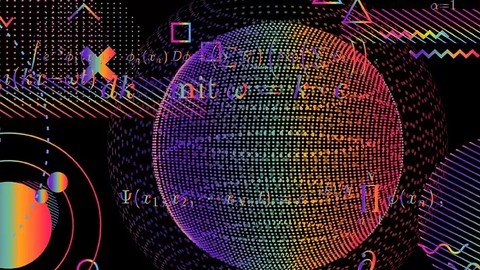
Published 4/2023
MP4 | Video: h264, 1280x720 | Audio: AAC, 44.1 KHz
Language: English | Size: 3.59 GB | Duration: 6h 36m
Exploring Quantum Computing with Qiskit:A Comprehensive Beginner's Guide to Quantum Computing Fundamentals,Quantum Gates
Free Download What you'll learn
Understand the fundamental principles of quantum computing, including qubits, quantum gates, and entanglement.
Have knowledge of various single-qubit gates, such as X, Y, Z, and Hadamard gates, and their respective gate notations and matrix representations.
Understand the principles of multiple-qubit gates, such as the CNOT, CZ, Swap, and Toffoli gates, and their notations.
Gain practical experience using Qiskit
Requirements
No prior knowledge or experience in quantum computing is required to take this course. However, learners should have a basic understanding of linear algebra and programming concepts. It is also recommended to have a computer with a reliable internet connection and the ability to install Qiskit, a popular quantum computing framework. Don't worry if you are new to programming or don't have experience with Qiskit, as we will guide you through the installation process and provide step-by-step instructions for each exercise.
Description
Are you ready to dive into the fascinating world of quantum computing? In this course, we will start with the foundation of quantum computing: the qubit. You will learn about qubit notation and the matrix representation, including vector notation and the famous Bloch sphere.We will explore the essential single-qubit gates, such as the X gate, the Hadamard gate, Y gate, Z gate, S gate, and T gate, and their respective gate notations and matrix representations. You will also delve into the world of multiple qubit gates, such as the CNOT gate, CZ gate, Swap gate, and Toffoli gate, and their notations.But what makes quantum computing so revolutionary is entanglement, and we will cover this topic in detail, including the concept of Bell's state. And we will end our journey with superdense coding, the exciting concept of sending multiple classical bits of information using only one qubit.Through a mix of theoretical and practical exercises using Qiskit, a popular quantum computing framework, you will gain the skills to start programming your own quantum applications. By the end of this course, you will have a solid understanding of the fundamental concepts and tools needed to take the next step in the fascinating world of quantum computing. Get ready for an exciting adventure!
Overview
Section 1: Math prerequisites
Lecture 1 Complex numbers: The form of a complex number
Lecture 2 Complex numbers: complexe conjugate
Lecture 3 Complex numbers: Euler notation
Lecture 4 Matrices: Introduction
Lecture 5 Matrices: Matrix addition
Lecture 6 Matrices: Matrix multiplication
Lecture 7 Matrices: Scalar multiplication
Lecture 8 Matrices: Square matrix
Lecture 9 Matrices: Identity matrix
Lecture 10 Ket and bra notation, ket notation
Lecture 11 Ket and bra notation, bra notation
Lecture 12 Inner product
Section 2: Qubit
Lecture 13 Introduction
Lecture 14 Examples for calculation of probability-part 1
Lecture 15 Examples for calculation of probability-part 2
Lecture 16 Matrix representation
Lecture 17 Matrix representation, examples, part 1
Lecture 18 Bloch sphere
Section 3: Quantum gates: Single quantum gates
Lecture 19 X gate (NOT gate)
Lecture 20 X gate, examples, part 1
Lecture 21 X gate, examples, part 2
Lecture 22 Hadamard gate
Lecture 23 Y gate
Lecture 24 Z gate
Lecture 25 S gate
Lecture 26 T gate
Section 4: Multiple Qubit
Lecture 27 Tensor product
Lecture 28 Multiple qubit: examples
Section 5: Multiple qubit gates
Lecture 29 CNOT gate
Lecture 30 CNOT gate exercise 1
Lecture 31 CNOT gate exercise 2
Lecture 32 CZ gate
Lecture 33 CZ gate, exercise
Lecture 34 Swap gate
Lecture 35 Toffoli gate
Section 6: Coding: Qiskit
Lecture 36 Qiskit installation
Lecture 37 Hello world code
Lecture 38 X gate
Lecture 39 X gate, Bloch sphere and histogram
Lecture 40 H gate, statevector
Lecture 41 H gate, statevector 2
Lecture 42 H gate, Bloch sphere and histogram
Lecture 43 CNOT gate, draw circuit and histogram
Lecture 44 CNOT gate, case 2
Lecture 45 CNOT gate, Bloch sphere
Lecture 46 Swap gate
Lecture 47 Toffoli gate
Section 7: Application
Lecture 48 Entaglement and bell state
Lecture 49 superdense coding
Lecture 50 Superdense coding
This course is designed for anyone who is interested in learning about the fascinating world of quantum computing. No prior experience in quantum computing or programming is necessary. The course is suitable for beginners who want to gain a solid understanding of the fundamental concepts and tools needed to start programming their own quantum applications. It is also suitable for professionals in fields such as computer science, physics, engineering, and mathematics who want to expand their knowledge in quantum computing. If you have a curious mind and a passion for learning, then this course is for you.
Homepage
https://www.udemy.com/course/quantum-computing-a-comprehensive-beginners-guide/
Buy Premium From My Links To Get Resumable Support,Max Speed & Support Me
Links are Interchangeable - Single Extraction
Comments

